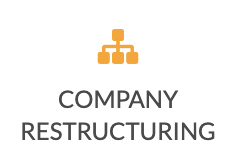Company Restructuring
Most business owners are not too concerned about company restructuring at the start-up stage. They just want to get up and running and will, typically, form a single limited company, possibly after commencing as a sole trader or partnership. As activities expand and the needs of the business become more complex, this structure may no longer be sufficient or appropriate for the needs of the business.
Business owners may want to merge operations into a single company. Meanwhile, in other situations, for example, to resolve a business dispute, sell a portion of business or to manage risk, the activities of a company may need to be split into separate companies. Alternatively, a restructuring or re-organisation may be required to manage disclosure requirements.
Creating a group structure and re-organising the operations is often the right solution, but it is imperative that the correct steps are taken in advance so that the desired outcome is achieved.
In creating a group, the default for many has been the old reliable golden share. However, depending on the needs of the client, this may not be the best option. Factors that should be considered include the group requirements from a taxation perspective, the ability to transfer assets within the group, the ability to potentially pay dividends up to the holding company free of tax and close company surcharge and the future impact of any change of ownership arising from creating a group structure.
How We Can Help With Your Company Restructuring
Each re-structuring or re-organisation is different and will need separate consideration. We provide advice on all areas of the restructuring process from developing the plan to providing taxation, company law and financial reporting advise.
Below are some of the options that can be used:
- Share-for-share exchange – Creation of a group or the merging of companies into a group
- Share for undertaking exchange – transferring trades/businesses/undertaking/100% subsidiary companies out to new companies in return for shares being issued to the owners.
- Merger by absorption/Merger by acquisition
- Introducing key members as shareholders of the Company. Advice and implementation of share schemes for key employees
- Creation of new class of shares and new rights
- Bonus issue of shares
- Sub-division shares
- Summary approval procedure to allow for the reduction and variation of share capital
- Share buyback and redemption
- Members Voluntary Liquidation – acting a liquidator or advising on the tax aspects of this.
How We Can Help With a Company Restoration
The general improvement in economic conditions – and particularly rising property values – is increasingly motivating directors to seek to restore dissolved companies that still hold value.

The additional motivation for restoring a company that is still trading is to return its operating status to that of a legal entity, with all the benefits of being an Irish registered company, including limited liability. Any assets vested with the Minister of Finance on the company’s dissolution will be returned, and anything done in the name of the company while it was not on the register will be treated as if the company had been on the register.

If the directors seek to restore the company within 12 months, then they can avail of an administrative restoration (Note: If the Company is a Company Limited by Guarantee then it is within 6 years). However, if the company is dissolved for more than a year (or 6 years for a Company Limited by Guarantee), the directors must apply to the High Court for restoration. In either case, OmniPro can look after the process on behalf of your client. In the case of the more complex High-Court restoration, we will also engage and instruct our specialist legal partner on your behalf.




